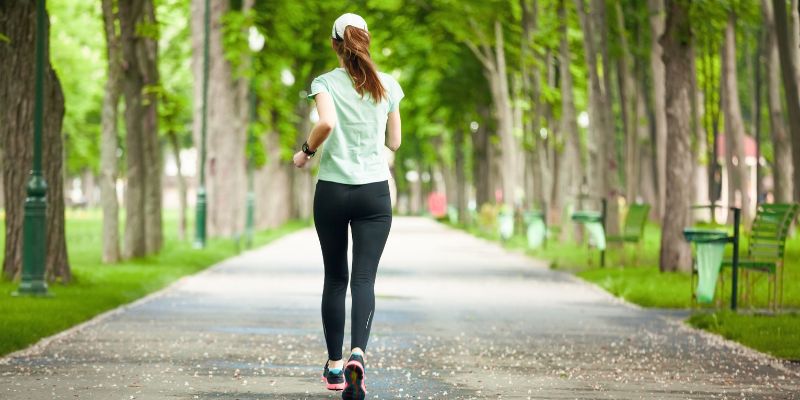
Park staff across England and Wales are to be trained in intervention techniques when they spot cases of women experiencing different forms of harassment in public spaces.
Bystander training for people who work or volunteer in these spaces follows research by the University of Leeds which concluded that most women and girls feel unsafe in parks in some situations.
The launch will see 500 further park staff being trained. It follows pilot sessions in the West Yorkshire region where the initiative was first developed.
Using Keep Britain Tidy’s Green Flag Award network to engage parks staff and volunteers; this tailored training uses scenario-based learning to enhance bystander intervention in public parks.
It stands alongside the broader Stand Up Against Street Harassment programme, which is available to the public and delivered nationally by the Suzy Lamplugh Trust.
Making parks safer
Dr. Anna Barker from the School of Law spearheaded the project, in collaboration with Keep Britain Tidy and the Suzy Lamplugh Trust, a charity focused on personal safety, stalking, and harassment.
Informed by Dr. Barker’s Safer Parks research, the training scenarios – which are co-designed with park managers and sexual violence prevention trainers – address various forms of harassment experienced by women and girls. Location-specific scenarios tailored to different regions immerse trainees in familiar park settings, grounding discussions for greater impact.
Harassment is a big problem in public spaces, and parks are no exception. The women who were interviewed for Dr Barker’s research agreed that it did not feel safe to challenge harassment when it happened to them, nor were they confident that someone else would intervene on their behalf.
Whilst the UK’s 27,000 parks provide essential green spaces for exercise, socialising, relaxation, and active travel routes away from busy roads, some one in six women feel unsafe in parks during daylight hours, a ratio three times higher than men
Allowing harassment to go unaddressed lets injustice persist. Everyone—from park managers to community groups—can play a role in making parks safer.
Research shows that women's heightened fear is particularly pronounced in parks compared to other public spaces like streets, town centres or public transport.
Consequently, women often limit park visits, avoid certain times or going alone, and adapt their behaviour for safety, thus missing out on the well-documented health and well-being benefits of parks.
Dr Barker said: "Allowing harassment to go unaddressed lets injustice persist. Everyone—from park managers to community groups—can play a role in making parks safer. This training equips people, everyone from park staff to members of the general public, with the skills to intervene safely and effectively.
"Rolling out bystander training across parks in England and Wales is a crucial step toward creating safer public spaces for women and girls. By equipping individuals with the tools to recognise and respond to harassment, we can make a real impact in reducing harassment and ensuring parks remain welcoming for all.”
The campaign also features four powerful posters highlighting real harassment scenarios and the 5Ds of bystander intervention in action. They were designed to urge park staff, volunteers, and the wider public to get trained and actively build a network of confident, engaged bystanders in the UK’s parks and open spaces.
The training will be evaluated to provide evidence of what works, which is particularly important in the context of the government’s commitment to halve violence against women and girls (VAWG) in a decade.
Building on previous research
According to research by L’Oréal Paris and IPSOS between 2019 – 2021, some 80% of women in the UK have reported experiencing harassment in public spaces, and 75% of harassment victims said no one helped.
The free half hour Stand Up Against Street Harassment training is available to everyone, and uses the principle of the 5Ds – Distract, Delegate, Document, Delay, and Direct – which are methods a person can use to support someone who’s being harassed. They are designed to prioritise safety and not to escalate situations, with four of them using indirect methods of intervention.
Saskia Garner, Head of Policy and Campaigns at the Suzy Lamplugh Trust said: "Everyone deserves to feel safe. Yet, our research reveals a disturbing reality: many people, most especially women, are subjected to harassment in our public spaces. This is unacceptable. The Stand Up Against Harassment bystander intervention training is designed to tackle this pervasive issue head-on.
“By partnering with L'Oreal Paris through the Stand Up initiative, we are committed to equipping people with the tools to confront public harassment. Trained bystanders have the power to make a real difference, offering crucial support to victims and enhancing their sense of safety.
“We are thrilled to bring this vital training to those who work in and enjoy our parks and open spaces across England, Scotland and Wales, and we encourage members of the public to sign up and get trained too, so we can work together to foster a community where everyone can feel safe."
Further information
Image: Adobe Stock
For media enquiries please contact Morgan Buswell via m.buswell@leeds.ac.uk